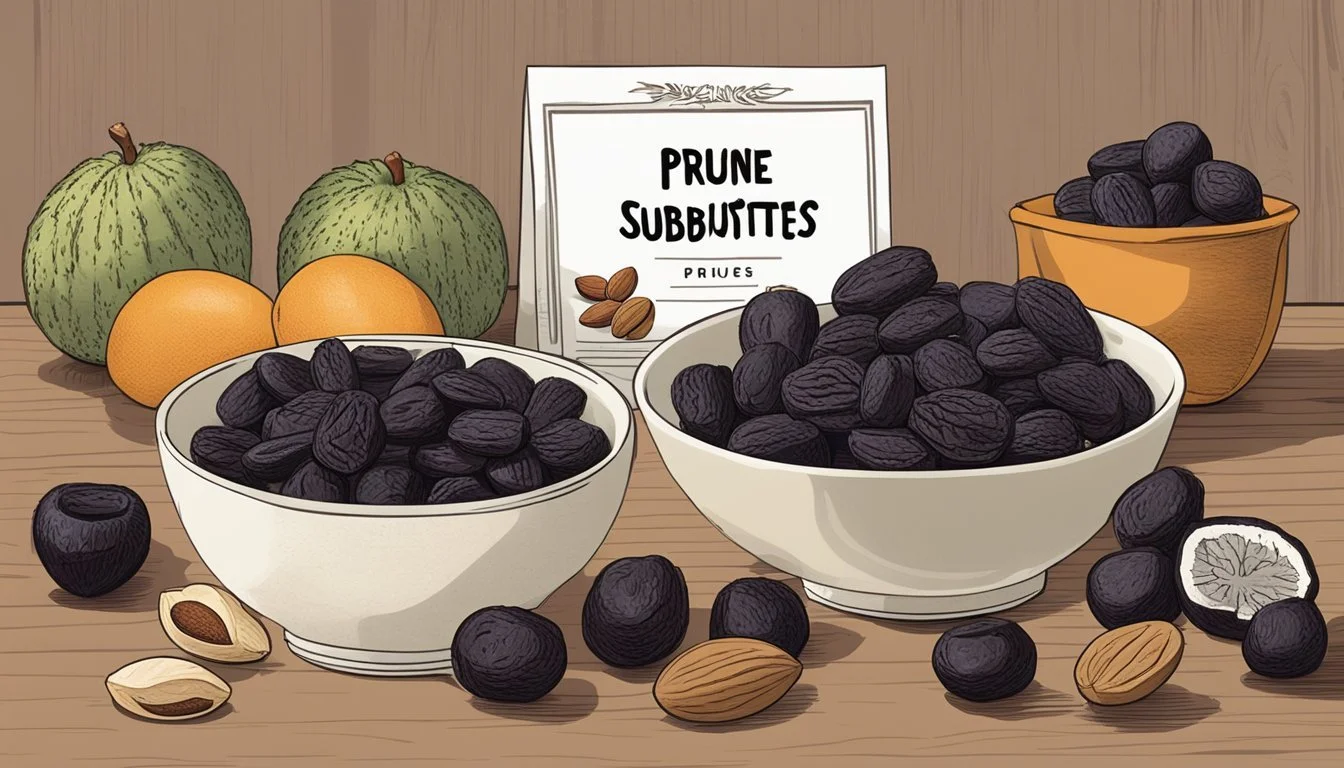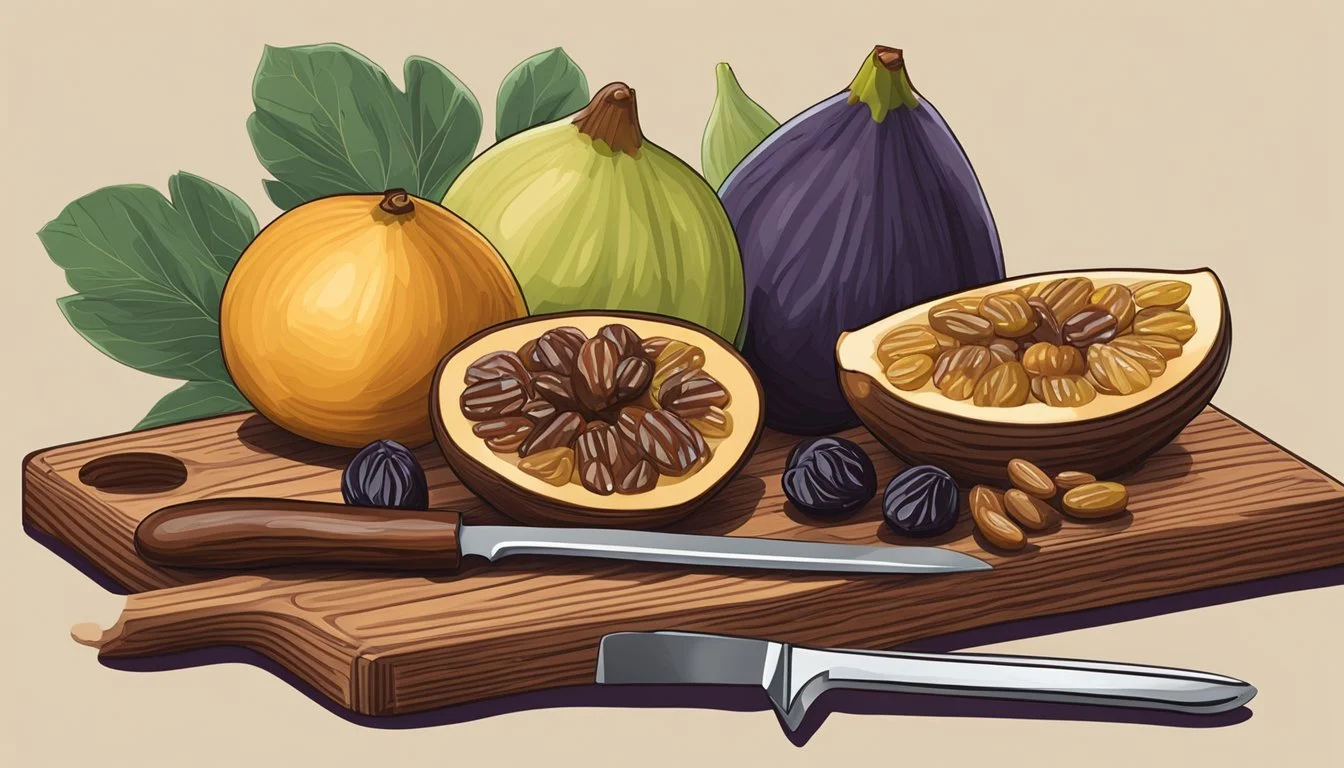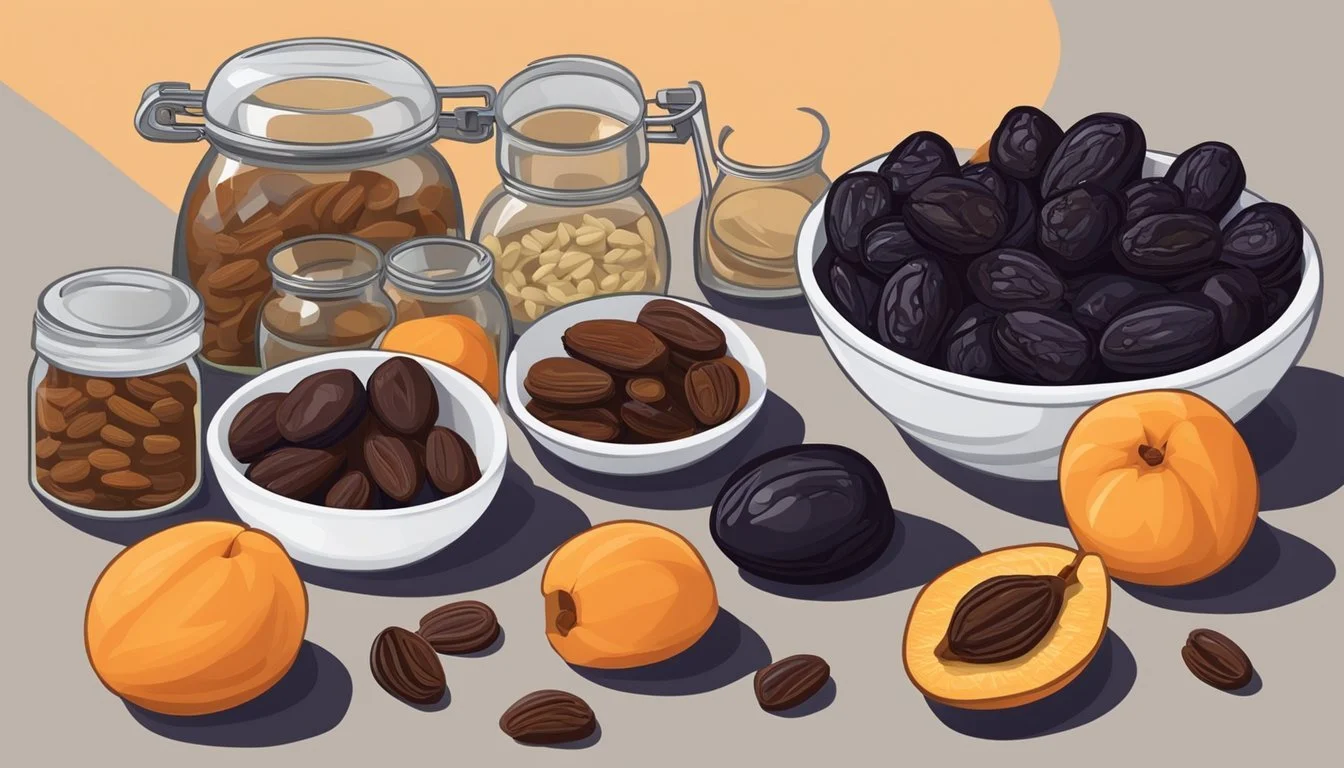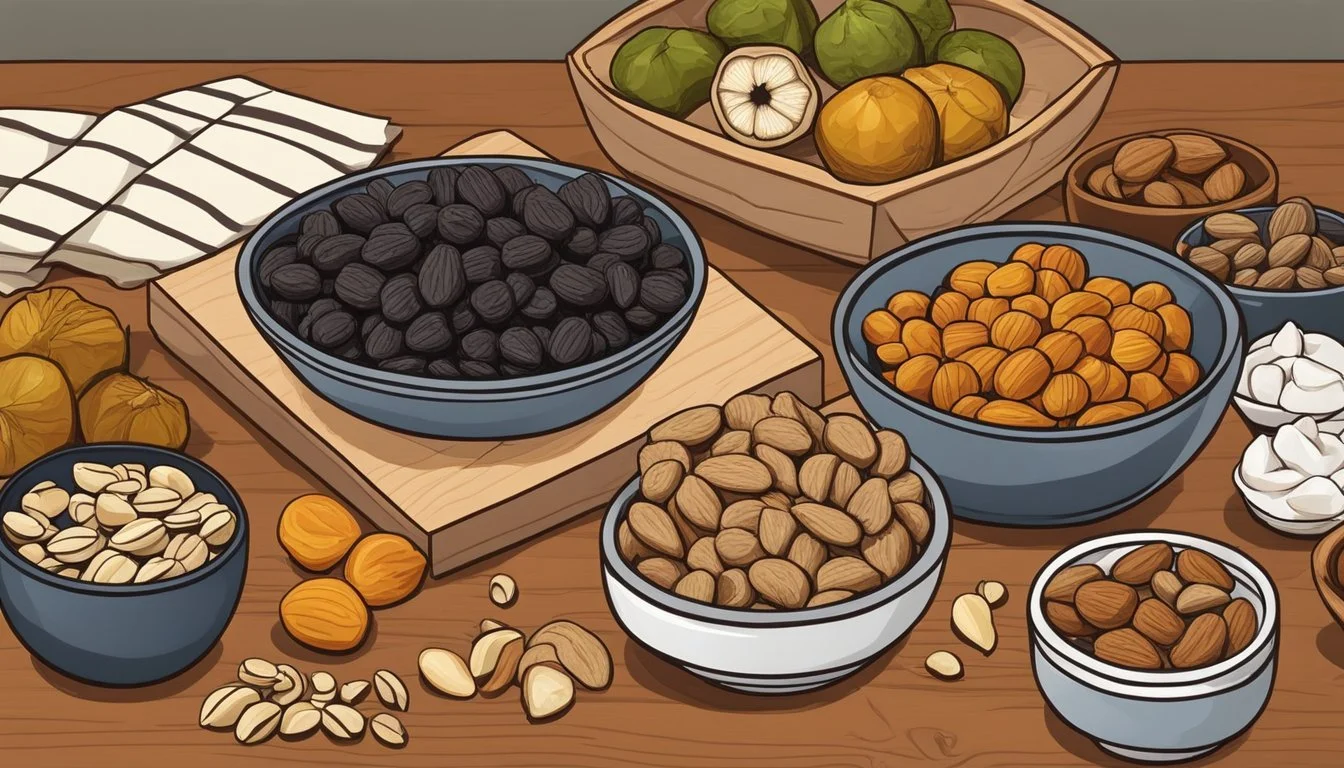Prune Substitutes
Top Alternatives for Your Recipes
When looking to diversify culinary flavors or address dietary restrictions, finding suitable substitutes for common ingredients is essential. Prunes, which are dried plums known for their sweet taste and chewy texture, are frequently used in cooking and baking. They lend a depth of flavor and moisture to dishes and provide a rich source of dietary fiber, vitamins, and antioxidants. However, whether due to personal taste preferences, availability issues, or the desire for variety in the kitchen, there may be times when an alternative to prunes is necessary.
Fortunately, there are several viable prune substitutes that maintain the integrity of recipes while offering their own unique benefits. Apricots, for instance, share many nutritional and textural qualities with prunes and can effortlessly replace them in most dishes. Similarly, raisins, with their intense sweetness and chewiness, can mimic the texture and taste that prunes add to recipes. These substitutions not only allow for seamless integration into existing recipes but also provide an opportunity to tailor dishes to individual taste profiles and health considerations.
Whether one seeks to tweak sweet or savory creations, understanding and utilizing a variety of prune substitutes can enhance and expand any culinary repertoire. With each alternative offering a different flavor, texture, and nutritional profile, they can all serve as versatile components in the kitchen, ensuring that dishes are flavorful and well balanced.
Benefits of Using Prune Substitutes
When prunes are unavailable or one seeks variety, alternative dried fruits provide an assortment of health benefits. Raisins, the most notable substitute, are a rich source of antioxidants and minerals, and like prunes, contain a significant amount of dietary fiber that aids in digestive health.
Nutrient Benefit Vitamins Support overall bodily functions Potassium Essential for heart and muscle function Vitamin K Crucial for bone health Fiber Enhances digestive health Antioxidants Combat oxidative stress in the body
Substitutes such as raisins are low in fat and sodium, making them a heart-healthy option. They carry an ample amount of vitamins contributing to overall well-being. In the context of bone health, raisins provide a fair measure of vitamin K and potassium, which are vital in maintaining bone density and strength.
For individuals managing caloric intake, prune substitutes may offer a lower calorie option while still imparting the sweetness and texture desired in various recipes. Incorporating these alternatives can introduce a varied flavor profile and nutritional value to the diet without compromising on the provision of essential nutrients.
Types of Prune Substitutes
When looking for prune substitutes, one primarily considers dried fruits for their similar texture and natural sugars, alongside other sweeteners with complementary flavor profiles.
Dried Fruit Alternatives
Various dried fruits come close to matching prunes in terms of sweetness, texture, and nutritional value. They are particularly useful in recipes that require a similar moisture content and natural sugar concentration. Notable among these are:
Apricots: Offering a slightly tangy taste, dried apricots are structurally similar to prunes and can be used in equal measure.
Figs: Rich in fiber, figs are a wholesome substitute, providing a unique, subtly sweet flavor.
Dates: Known for their rich, caramel-like sweetness, they are an excellent alternative, especially in baked goods.
Raisins: Smaller but potent in flavor, raisins can be used in a reduced amount compared to prunes—about 1/4 cup of raisins for every 1/4 cup of prunes.
Other fruits such as bananas, apples, and peaches, when dried, offer different flavor profiles but can substitute prunes to adjust the sweetness and texture in various dishes.
Other Natural Sweeteners
In addition to dried fruits, certain natural sweeteners can be considered as alternatives to prunes. These might not replicate the texture but will provide the desired sweetness in recipes:
Pureed or mashed banana: Although fresh, the dense and sweet characteristics of banana make it a good alternative in baking.
Apple sauce: With a mild flavor, apple sauce can serve as a substitute while also adding moisture to recipes.
Using these alternatives, one can recreate the essence of what prunes offer to a dish, both in terms of sweetness and moisture. It is important to carefully consider the proportion and cooking times when substituting, to ensure the desired outcome in both texture and flavor.
Prune Substitutes in Baked Goods
Prunes, known for their natural sweetness and moistness, are commonly included in baked goods recipes. Alternatives can offer similar benefits while providing their unique flavors and textures.
For Sweetness and Moistness
Applesauce: Often used in recipes, applesauce can effectively replace prune puree to lend sweetness and moisture to various baked goods. Due to its consistency and naturally sweet flavor, applesauce works well in cakes and muffins.
Quantity: Substitute in a 1:1 ratio with prune puree.
Best for: Baked goods that don’t rely on the distinctive flavor of prunes.
Date Puree: Date puree is a staple substitute that mirrors the thick, sticky consistency of prune puree, adding both moisture and sweetness.
Quantity: Use an equivalent amount of date puree when replacing prune puree.
Best for: Items like brownies and cookies, where a rich, deep sweetness is desired.
For Texture and Binding
Dried Apricots: When finely chopped or pureed, dried apricots provide a similar texture to prunes, helping to bind ingredients in recipes.
Texture: Slightly chewier, imparting a tangier taste.
Use: Measure out an equal amount as prunes for consistent results.
Raisins: These dried grapes are a common substitute, boasting a naturally sweet profile and chewy texture which works well in baked goods.
Texture: Can offer a similar bite to prunes but are smaller and less dense.
Use: Ideal for cookies and bread, they can be pureed or used whole in equal measure compared to prunes.
Substitutes for Prunes in Cooking
When cooking, prunes are often chosen for their sweetness and texture, but there are multiple substitutes that can provide similar qualities to both savory and sweet dishes. Each alternative brings its own unique flavor profile and nutritional benefits to the culinary creation.
Savory Applications
In savory dishes, prunes contribute a complex sweetness and can be used to enhance the flavor of sauces and meat dishes. An efficient substitute is dried apricots, which offer a comparable texture and a sweet-tart taste that complements savory flavors. They should be chopped to the size of prunes for a consistent look and even cook.
Another practical alternative is raisins, known for their natural sweetness. They can be particularly effective in recipes requiring less volume yet a concentrated burst of flavor. One must adjust the quantity accordingly since raisins are smaller.
Substitute Characteristics Usage Tip Dried Apricots Similar in texture, sweet-tart Use in equal proportions Raisins Sweet, smaller in size Reduce quantity to prevent excess sweetness
Sweet Applications
For desserts and other sweet applications, the role of prunes can be more than just taste—it's also about the moisture and the dense, smooth texture they add. Peaches are an excellent choice in this regard when used in their dried form. They provide the necessary sweetness and moisture similar to prunes. Fig is a natural alternative too, with a unique flavor that pairs exceptionally well with sweet ingredients.
It's also possible to use prune puree as a substitute for added sugar or fat in baked goods. It maintains a smooth consistency in the final product, although it should be used in moderation to avoid overpowering the dish with prune flavor.
Substitute Characteristics Usage Tip Dried Peaches Sweet, adds moisture Ideal for fruit-based desserts Fig Unique flavor, pairs with sweet components Perfect for bars and confections Prune Puree Reduces fat, substitutes added sugar Utilize in baked recipes for a healthy twist
Health Considerations and Dietary Benefits
When considering prune substitutes, one should assess their dietary fiber content as well as their sugar and fat profiles to maintain digestive health and manage caloric intake.
Digestive Health and Fiber Intake
Prunes are widely recognized for their fiber content which significantly aids in digestive health. A serving of four to five prunes provides about 280 milligrams of potassium and is replete with dietary fiber that can help prevent constipation. Prune substitutes should ideally contain similar levels of fiber to promote gut health and aid in regular bowel movements. Foods high in fiber not only assist in managing digestive issues but may also contribute to blood sugar control as they help slow down the absorption of sugar.
Key Nutrients in Prunes:
Dietary Fiber
Vitamin A
Vitamin K
Potassium
Substitutes like raisins, which also offer a considerable amount of dietary fiber, can be a healthy snack alternative, contributing to overall digestive wellness and functioning as a mild laxative.
Sugar and Fat Content
While prunes and their substitutes like raisins provide essential vitamins and minerals, one must consider their natural sugar content. Prunes contain intrinsic sugars, but they are low in fat and do not contain added sugars, which makes them suitable for a health-conscious diet. Substitutes that mimic this low fat and naturally-occurring sugar profile are preferable for maintaining a balanced diet. Excessive intake of added sugars or high-fat content can negate the positive effects that come from the fiber and nutrient-rich profile of prunes.
Nutritional Profile Comparison:
Nutrient Prunes Typical Substitute (e.g., Raisins) Dietary Fiber High High Natural Sugars Moderate Moderate to High Fat Low Low Vitamins A & K Present Varies Potassium Significant Moderate
Substitute options should be carefully selected for their nutritional value and health benefits, taking into account individual dietary needs and restrictions.
Adapting Recipes With Prune Substitutes
When adapting recipes that call for prunes, various dried fruits can serve as substitutes, providing similar sweetness and texture. They each bring a unique taste profile and nutritive value, such as carbohydrates, vitamins, and minerals.
Raisins
Raisins offer a more intense flavor than prunes and impart additional sweetness to recipes. They are particularly rich in antioxidants and vitamins. To replace prunes with raisins in a recipe, use an equal amount:
1/4 cup prunes = 1/4 cup raisins
Dried Apricots
Dried apricots, high in Vitamin A, are an excellent substitute for prunes, sharing a comparable fibrous texture:
1 prune = 1 dried apricot
Other Alternatives
Other alternatives include figs and dates. They are also rich in fiber and nutrients, but their taste can differ significantly from prunes:
1/4 cup prunes = 1/4 cup chopped figs or dates
Sugar Alternatives
Prunes can be replaced by prune puree to reduce added sugars in sauces and stir-fries:
1 tbsp sugar in a recipe = 1 tbsp prune puree
Nutrient Comparison
Substitute Taste Protein Vitamin A Carbohydrates Raisins Sweet, intense Low Low High Dried Apricots Sweet, tangy Low High Moderate Figs Sweet, mellow Moderate Low High Dates Very sweet Low Low Very high
In summary, when replacing prunes, select a substitute that aligns with the desired sweetness and texture of the dish, while also considering the nutritional content.
Alternative Uses of Prune Substitutes
Prune substitutes provide flexibility in various diets and serve as nutrient-rich snacks or energy foods, accommodating diverse dietary requirements and preferences.
In Dairy-Free and Vegan Diets
Dairy-Free Means: Individuals following dairy-free or vegan diets often seek alternatives that do not compromise on taste and nutritional value. Raisins and dried apricots, both suitable substitutes for prunes, are inherently dairy-free and vegan, making them excellent for use in recipes that traditionally include prunes. They can be incorporated into dairy-free desserts, smoothies, and even gluten-free baked goods to add natural sweetness and a chewy texture without the use of animal products.
Raisins: High in antioxidants and fiber, good for digestion
Dried Apricots: Rich source of vitamins A and C, promotes skin and eye health
As Snacks and Energy Foods
Prune substitutes make for portable and convenient snack options. They provide a quick source of energy due to their natural sugars and can be an integral part of a vegetarian or vegan diet, thanks to their nutrient profile.
Snack Ideas:
Trail mixes with a combination of nuts and seeds
Homemade energy bars or balls combining oats, almond butter, and dried fruit
Energy Benefits:
Raisins: Deliver a quick boost of energy; low in fat and sodium.
Dried Apricots: Contribute to sustained energy levels with their fiber content.
Storage and Preparation of Prune Substitutes
When opting for substitutes like raisins, dried figs, or dried apricots in place of pitted prunes, one must consider appropriate storage and preparation methods to maintain quality and flavor. Each substitute has unique characteristics that affect how it should be handled.
Raisins:
Storage: Keep them in a cool, dry place to prevent moisture accumulation. In airtight containers, raisins can last up to a year.
Preparation: No preparation is needed unless a recipe calls for plumping. In such cases, soak them in hot water for about 10 minutes.
Substitute Storage Condition Preparation Needed Flavor Note Dried Figs Store in a cool, dry area; airtight containers preserve them for 6-12 months. Often consumed as is; can be diced for baking. They possess a unique, sweet taste suitable for recipes like gingerbread. Dried Apricots Best kept refrigerated in a sealed container; can last up to 6 months. Chop if used in baking or cooking; otherwise, ready to eat. They offer a sweet-tart flavor, less intense than prunes.
Blender Usage:
For recipes requiring prune puree, one can substitute with purees of these dried fruits. Use a blender to create a consistent puree, adding water as necessary to reach the desired consistency.
Flavor Profile:
Strong Flavor: Dried figs and apricots have a stronger flavor, so use them sparingly to avoid overpowering the dish.
Gingerbread: Dried figs complement spicy and warm dishes like gingerbread due to their rich flavor.
Incorporating these substitutes requires attention to detail to ensure the preservation of the dish’s intended taste and textural qualities.
Culinary Techniques With Prune Substitutes
When cooking with prune substitutes, specific techniques such as pureeing and blending or chopping and soaking can be employed to achieve similar textures and flavors to that of traditional California prunes.
Pureeing and Blending
One can create substitutes for prune puree, which is often used in recipes for its moisture and sweetness. Applesauce, which has a moist and fibrous consistency, makes an excellent one-to-one substitution for pureed prunes in baking and cooking. It's particularly useful to maintain the desired consistency in cakes, muffins, or health bars. For a richer, nuttier flavor, nut butters can be used as a spread or in baking recipes, although they may alter the end product's texture and taste.
Bananas: Mashed bananas can be used in a 1:1 ratio to replace prune puree, offering sweetness and a creamy texture.
Fresh Peaches: Pureed fresh peaches can also be an alternative, providing a different flavor profile with a similar texture, but they may be less sweet than prunes.
Chopping and Soaking
Dried fruits like raisins, cherries, and apricots are often used as direct replacements for chopped California prunes. To mimic the chewy texture of dried prunes, soaking these fruits in warm water or juice until they plump can be beneficial.
Substitute Soaking Time Texture After Soaking Raisins 15-20 minutes Plump and chewy Cherries 20-30 minutes Soft with slight chew Apricots 30-40 minutes Tender and meaty
Soaked European plums, the fresh counterpart to prunes, can be used in savory dishes, compotes, or stuffings, bringing a balance of sweetness and tartness. Offering varied textures and flavors, these substitutes expand the possibilities in culinary applications where prunes would typically be used.
Creating Sweet Preserves Without Prunes
When crafting sweet preserves, one does not need to rely solely on prunes. A variety of fruit options exist to create jams, jellies, and preserves that offer a naturally sweet taste.
Peach Preserves: Peaches are a succulent alternative that can be used to make a richly flavored preserve. To make peach preserves, one should start with ripe, peeled peaches, diced and cooked down with sugar to achieve the desired consistency.
Ingredients:
Ripe peaches
Sugar
Apple Jellies: For a more gelatinous spread, apple jellies are an excellent choice. Using applesauce as the base, combined with pectin and a sweetener, they yield a smooth jelly with an appealing clarity and a sweet, tangy flavor.
Method:
Combine applesauce with sugar.
Add pectin and cook to set.
Alternative Sweeteners: In place of sugar, one may also consider honey or maple syrup to sweeten the preserves or jellies, allowing for the nuanced flavors of the fruits to shine through.
Sweetener Options:
Honey
Maple Syrup
When selecting fruit for preserves, attention should be paid to the natural pectin content of the fruit to ensure proper set without the addition of too much additional pectin. Stone fruits like peaches often have enough natural pectin to create a thick preserve. In contrast, apple jellies might require an extra pectin boost due to the straining process typical in jelly making, which can remove some of the natural pectin found in the fruit's skin.
In conclusion, the absence of prunes in the preserve-making process opens up a plethora of possibilities for delicious and creative spreads that capture the essence of the fruit used, with peach preserves and apple jellies standing out as notable and delectable examples.
Prune Substitutes in Meat Dishes
When preparing meat dishes, prunes often add a unique sweetness and texture that complements the savoriness of beef and other meats. However, there are instances where a cook may need to find a suitable replacement for prunes. It is essential to select alternatives that preserve the desired taste and contribute to the overall savory profile of the dish.
Dried Apricots: Apricots can mimic the texture and subtle sweetness of prunes. They are particularly effective in stews that require long cooking times, which allow the apricots to impart their flavor into the meat.
Raisins: Smaller than prunes, but with an intense flavor, raisins can be used sparingly to infuse sweetness into savory beef dishes.
Taste Considerations: When substituting prunes, it's crucial to balance the sweetness to avoid overpowering the meats' natural flavors.
Substitute Quantity to Use Suitable For Dried Apricots Equal weight to prunes Slow-cooked stews and roasts Raisins Start with half the amount of prunes, adjust to taste Braises and minced meat mixtures
One should always consider the cooking method when choosing a substitute. Dried apricots and raisins work well in slow-cooked dishes where they have time to blend with the complex savory flavors. Quick cooking methods may not achieve the same depth, so adjusting cooking techniques and times may be necessary to replicate the taste balance prunes usually offer.










